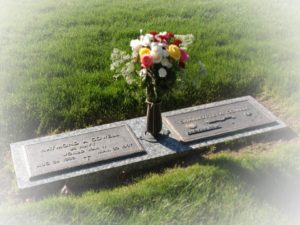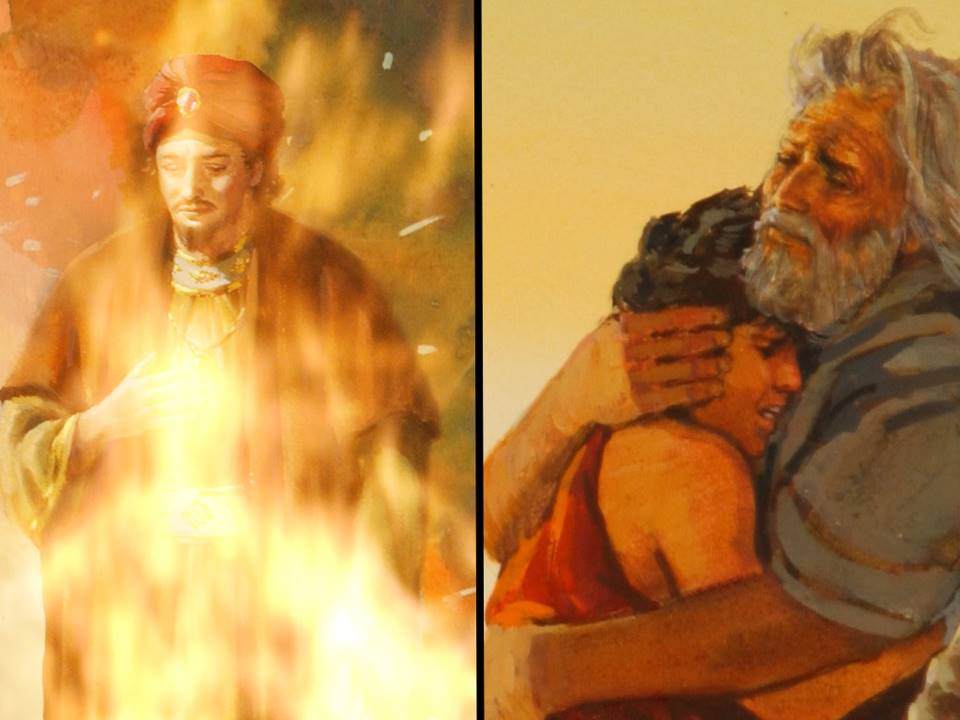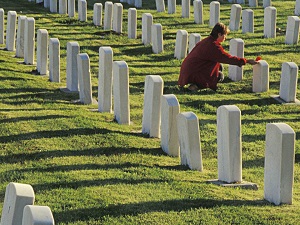
When a person dies where does he go?

Samuel Smith
23 Jan'19
5
LESSON 4
WHEN A PERSON DIES WHERE DOES HE GO?
You are welcome to another edition of Insights from God's Word, a Bible study programme that is committed to sharing God's Word by allowing the Bible to speak for itself.In this edition, we continue with our series on The Truth About Death. In this study, I want us to consider the questions: When a person dies where does he go? Where are our dead friends and relatives? Are they in Paradise? Hell? Purgatory? Some spirit world? Reincarnated? Or asleep in their graves? What is the position of God's Holy Word, the Bible, on the abode of the dead? In this study, we are going to explore what the Bible teaches on this important subject.
Several doctrines abound in the religious world today in relation to where our dead friends and relatives are found. We are going to consider a few of these teachings and compare their basic tenets with God's authoritative Word, the Bible. Outlined below are some of the popular doctrines that have to do with the abode of man after death:
1. PURGATORY
"Purgatory, according to Catholic Church doctrine, is an intermediate state after physical death in which those destined for heaven "undergo purification, so as to achieve the holiness necessary to enter the joy of heaven". - Catechism of the Catholic Church, 1030; https://en.m.wikipedia.org › wiki › Purgatory"Purgatory": "All the souls in Purgatory have died in the love of God, and are certain to enter heaven. But as yet they are not pure and holy enough to see God, and God’s mercy allots them a place and a time for cleansing and preparation." - W. E. Addis and Thomas Arnold, A Catholic Dictionary, p 766.
According to Catholic belief, the living can pray on behalf of the souls in purgatory to hasten their release into heaven. From the Jesuit Seminary News, Vol. 3, no. 9. (Nov. 15, 1928), p. 70: we read the following:
"By prayer we temper the agonies of the souls in purgatory. We hasten their liberation by sacrifice."Beloved, a thorough study of Scripture reveals that the doctrine of purgatory is not based on the Word of God. The Bible clearly teaches that it is the blood of Christ that washes away our sins (
Friends, the doctrine of purgatory basically teaches consciousness of the soul after physical death which is opposite to the Bible's clear teaching on the condition of man after death (see
2. LIMBO
"In the theology of the Catholic Church, Limbo (Latin limbus, edge or boundary, referring to the "edge" of Hell) is a speculative idea about the afterlife condition of those who die in original sin without being assigned to the Hell of the Damned." https://en.m.wikipedia.org/wiki/LimboThe theory of limbo is understood "as a state which includes souls of infants who die subject to original sin and without baptism, and who, therefore, neither merit the beatific vision, nor yet are subjected to any punishment, because they are not guilty of any personal sin." - THE HOPE OF SALVATION FOR INFANTS WHO DIE WITHOUT BAPTISM; INTERNATIONAL THEOLOGICAL COMMISSION. www.vatican.va/roman_curia/congregations/cfaith/cti_documents/rc_con_cfaith_doc_20070419_un-baptised-infants_en.html
Friends, the theory of limbo, even though just a theological hypotheses of the Catholic Church basically teaches consciousness of the soul after death which is opposite to the clear Scriptural teaching on the state of man after death (see
3. REINCARNATION
Other religions also believe that people are reincarnated after physical death. "Reincarnation is the religious or philosophical concept that the soul or spirit, after biological death, begins a new life in a new body that may be human, animal or spiritual depending on the moral quality of the previous life's actions. This doctrine is a central tenet of the Indian religions." https://en.m.wikiquote.org/wiki/ReincarnationThe religious concept of reincarnation is found in major Indian religions such as Buddhism, Hinduism, Jainism, and Sikhism. This doctrine also teaches consciousness of the human soul after death which is opposite to the biblical teaching of what happens to man after death (see
4. THE SPIRIT WORLD
Within various African traditional religious settings, the people believe that their dead friends and relatives go to the spirit world after death. The belief that the dead go to the land of the spirits after death motivates such religious groups to perform several ceremonies for the dead. Some groups even go to the extent of burying their dead with certain items which they believe will be necessary for the dead person in the afterlife. During festivals and other important occasions, leaders of such religious communities pour libation to the spirits of their ancestors to claim from them blessings and goodwill for the living. This belief, even though widespread among many African communities and cultures is not based on Scripture. This religious belief also promotes the concept of consciousness of the human soul after death which is contrary to the Bible's position on the condition of man after death (see5. HELL
A large majority of Christians today believe hell is a temporary holding place for the spirits of people who have died in their sins. The quote below describes this teaching clearly:"There has always been a separation of believers and unbelievers after death (
Friends, even though the doctrine that the wicked go straight to hell immediately after death has become very popular in Christendom, it is not based on the Bible. However, from several pulpits in Christendom today, the satanic lie goes forth that the spirits of the wicked dead go straight to hell where they burn forever and ever. Beloved, if there is any doctrine in Christendom which has produced more atheists than genuine disciples for Christ, it is none other than the false teaching that the spirits of the wicked dead burn forever and ever in hellfire after their death.
Beloved, the Bible's clear teaching is that the wicked do not receive their punishment soon after death but are actually reserved unto fire against the day of judgement. Let's check the biblical evidence:
i) "That the wicked is RESERVED to the day of destruction? they shall be brought forth to the day of wrath" (
ii) "The Lord knoweth how to deliver the godly out of temptations, and to RESERVE THE UNJUST unto the day of judgment to be punished" (
iii) "But the heavens and the earth, which are now, by the same word are kept in store, RESERVED UNTO FIRE against the day of judgment and perdition of ungodly men" (
The texts above are clear on the fact that the wicked dead are not burning in hell now. Rather, they are RESERVED for punishment on the day of judgement and perdition of ungodly men. Since the day of judgement is yet to come, it is clear that the wicked then are not burning anywhere now. In fact, the Bible teaches that hellfire is yet to come from God out of heaven (
Friends, the Bible is clear. The wicked dead are not burning in hell now. Just like the righteous dead, they are also asleep in their graves (
6. PARADISE / HEAVEN
Majority of Christians today also believe that paradise is a temporary holding place for the spirits of people who have died in the Lord. The quote below describes this teaching clearly:"We could describe Paradise and hell or hades as temporary holding places until the New Jerusalem is established and the dead are joined back with their physical bodies. For those who have died in the faith, we know that they are present with the Lord right now because if a person is absent or deceased from their body, they are in the presence of the Lord (2 Cor 5:8)." - Jack Wellman is the pastor of the Mulvane Brethren Church in Mulvane, Kansas. Jack is also the Senior Writer at What Christians Want to Know.Beloved, many Christians believe that the souls of their departed brethren who died in the faith of Christ go straight to paradise or heaven after death. One particular passage in Scripture that has been grossly misinterpreted to forward this doctrine is the passage of
23:40 But the other answering rebuked him, saying, Dost not thou fear God, seeing thou art in the same condemnation?
23:41 And we indeed justly; for we receive the due reward of our deeds: but this man hath done nothing amiss.
23:42 And he said unto Jesus, Lord, remember me when thou comest into thy kingdom.
23:43 And Jesus said unto him, Verily I say unto thee, Today shalt thou be with me in PARADISE."
(
For instance, here are two major reasons why I believe the thief on the cross did not go to paradise that very Friday, but rather rested in his grave to await the general resurrection of the saints at the second coming of Christ:
a) The Bible clearly teaches that Christ Himself did not go to paradise that Friday after his death. In fact, when Christ resurrected from the dead on the first day of the week, He clearly told Mary Magdalene the following: "..., Touch me not; for I am not yet ascended to my Father: but go to my brethren, and say unto them, I ascend unto my Father, and your Father; and to my God, and your God" (
In other words, Christ was saying to Mary; don't continue to hold on to me; for I am yet to ascend to my Father in heaven. Friends, Christ made it to heaven after His resurrection on the first day of the week to obtain the assurance from the Father that His supreme sacrifice for mankind was accepted. Thus, His words; "Touch me not; for I am not yet ascended to my Father" (
Beloved, if this is what the Scripture teaches, then how can we believe that the thief made his way to paradise on that Friday when Christ Himself was asleep in Joseph's new tomb? How could the thief be with Christ in paradise when the Saviour Himself was not yet there?
b) Besides the above clear explanation from Scripture, many Bible scholars assert the apparent confusion in
You see friends, as Bible students, one thing we must know as we study and interpret Scripture is the fact that the original scrolls of the Bible did not contain punctuation marks as we have now. Scholars inserted punctuation marks to make the Scripture to be easily read and understood. And so, even though the Bible is inspired, sometimes we may have such punctuation errors to grapple with.
For instance, we have this punctuation mistake in the King James Version which was later corrected in the New King James Version:
"11 And God wrought special miracles by the hands of Paul: 12 So that from his body were brought unto the sick handkerchiefs or aprons, and the diseases departed from them, and the evil spirits went out of them" (
Now friends, if you consider the verse 12 critically, you will realize that there should be a comma after the word sick, otherwise the text there will mean that handkerchiefs and aprons that were sick were being healed. Of course, we have nothing like sick handkerchiefs or aprons. The point I want to make here is that there is a problem with the text because of a punctuation error. If a comma is placed after the word sick, the meaning of the text comes out clearly (see the correction of
According to some scholars, a similar case of punctuation error is what we find in
This interpretation synchronizes with the biblical fact in
7. THE GRAVE
When people die, whether they were righteous or not, they sleep in their graves awaiting one of two resurrections (i) "28 Marvel not at this: for the hour is coming, in the which ALL THAT ARE IN THE GRAVES shall hear his voice, 29 And shall come forth; they that have done good, unto the resurrection of life; and they that have done evil, unto the resurrection of damnation" (
ii) "And many of them that SLEEP IN THE DUST OF THE EARTH shall awake, some to everlasting life, and some to shame and everlasting contempt" (
Friends, the Bible's teaching on the abode of the dead is very clear. The dead rest in their graves awaiting one of two resurrections; either the resurrection of life or the resurrection of damnation. The patriarch Job rightly echoes this biblical truth with the following colourful words:
i) "13 If I wait, the GRAVE IS MINE HOUSE: I have made my bed in the darkness. 14 I have said to corruption, Thou art my father: to the worm, Thou art my mother, and my sister. 15 And where is now my hope? as for my hope, who shall see it? 16 They shall go down to the bars of the pit, when our rest together is in the dust" (
ii) "9 As the cloud is consumed and vanisheth away: so he that goeth down to THE GRAVE shall come up no more. 10 He shall return no more to his house, neither shall his place know him any more" (
From the psalmist, we come away with the same truth:
i) "What man is he that liveth, and shall not see death? shall he deliver his soul from the hand of THE GRAVE? Selah" (
ii) "O LORD, thou hast brought up my soul from THE GRAVE: thou hast kept me alive, that I should not go down to the pit" (
The apostle Peter also made the following statement in relation to the death of king David: "29 Men and brethren, let me freely speak unto you of the patriarch David, that, he is both dead and buried, and his sepulchre is with us unto this day... 34 For David is not ascended into the heavens" (
Friends, this is the biblical truth. David, that man after God's own heart (
Beloved, from the various scriptural passages we have gone through so far, it is very clear that the wicked dead as well as the righteous dead all go down into silence (
All the other doctrines we reviewed in the earlier part of this study concerning the abode of the dead (such as purgatory, limbo, reincarnation, the spirit world of the dead, the righteous going to paradise or heaven immediately after death, and the wicked going to hell immediately after death) are not based on Scripture. Each of these doctrines promote the concept of consciousness of the human soul after death which is opposite to the biblical doctrine that the dead do not know anything (
Exhortation: "Whatsoever thy hand findeth to do, do it with thy might; for there is no work, nor device, nor knowledge, nor wisdom, in the grave, whither thou goest" (
"And this is the will of him that sent me, that every one which seeth the Son, and believeth on him, may have everlasting life: and I will raise him up at the last day" (
In our next study, we will consider the topic: Don't the righteous rest in Abraham's bosom after death? The Bible Study reference for this study is
Stay blessed and keep shining for King Jesus.
Maranatha!
Powered by White Throne Ministries












